外研版七年级下英语M10U3学案
Module10Unit3语法导学案 外研版英语七年级下册
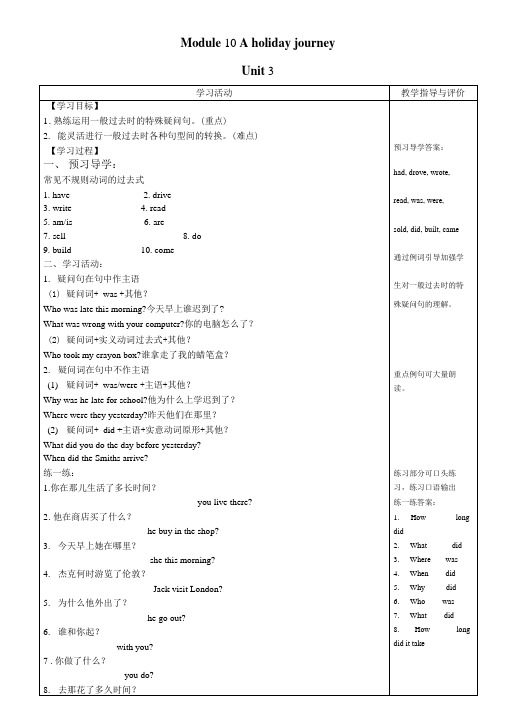
Module 10 A holiday journeyUnit 3学习活动教学指导与评价【学习目标】1.熟练运用一般过去时的特殊疑问句。
(重点)2.能灵活进行一般过去时各种句型间的转换。
(难点)【学习过程】一、预习导学:常见不规则动词的过去式1. have ______________2. drive ________________________3.write ______________4. read __________________________5. am/is ______________6. are ___________________________7.sell8. do9. build ________ 10. come二、学习活动:1.疑问句在句中作主语(1)疑问词+ was +其他?Who was late this morning?今天早上谁迟到了?What was wrong with your computer?你的电脑怎么了?(2)疑问词+实义动词过去式+其他?Who took my crayon box?谁拿走了我的蜡笔盒?2.疑问词在句中不作主语(1)疑问词+ was/were +主语+其他?Why was he late for school?他为什么上学迟到了?Where were they yesterday?昨天他们在那里?(2)疑问词+ did +主语+实意动词原形+其他?What did you do the day before yesterday?When did the Smiths arrive?练一练:1.你在那儿生活了多长时间?_______ _________ _________ you live there?2.他在商店买了什么?_______ ________ he buy in the shop?3.今天早上她在哪里?_______ ________ she this morning?4.杰克何时游览了伦敦?Jack visit London?5.为什么他外出了?_______ _________ he go out?6.谁和你起?____ _____ with you?7 .你做了什么?you do?8.去那花了多久时间?预习导学答案:had, drove, wrote, read, was, were, sold, did, built, came通过例词引导加强学生对一般过去时的特殊疑问句的理解。
外研版英语七年级下Module10 Unit3教案
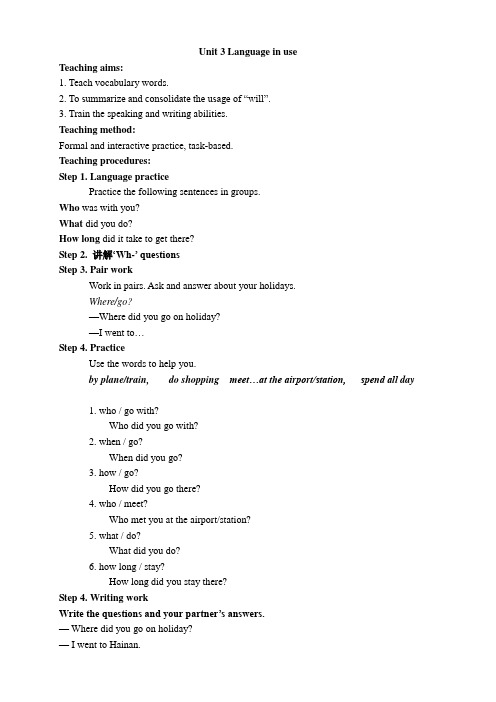
Unit 3 Language in useTeaching aims:1. Teach vocabulary words.2. To summarize and consolidate the usage of “will”.3. Train the speaking and writing abilities.Teaching method:Formal and interactive practice, task-based.Teaching procedures:Step 1. Language practicePractice the following sentences in groups.Who was with you?What did you do?How long did it take to get there?Step 2.讲解‘Wh-’ questionsStep 3.Pair workWork in pairs. Ask and answer about your holidays.Where/go?—Where did you go on holiday?—I went to…Step 4.PracticeUse the words to help you.by plane/train, do shopping meet…at the airport/station, spend all day1. who / go with?Who did you go with?2. when / go?When did you go?3. how / go?How did you go there?4. who / meet?Who met you at the airport/station?5. what / do?What did you do?6. how long / stay?How long did you stay there?Step 4.Writing workWrite the questions and your partner’s answers.— Where did you go on holiday?— I went to Hainan.Step 5.Pair workWork with a new partner. Ask and answer about your first partner.—Where did … go on holiday?—He/She went to Hainan.Step 5. Complete the postcard with the correct form of the words from the box.go, have, swim, take, visit, writeHi Mum,I’m ______ a really good time. I’m _______ this postcard at the airport.We were at the hotel for four days. We ______ in the sea, ________ some museums and ______ lots of photos. We also ______ shopping.See you soon.Lots of love,BettyStep 5.PracticeChoose the correct answer.1.Today is Wednesday, so yesterday / tomorrow was Tuesday.2.I was there last / next week.3.I’m going to travel around the world many years ago / in the future.4.They’re eating at a great restaurant right now / soon.5.The palace was not open in 1995 / 2103.Step 6. Around the worldAn interesting holiday:Step 7. WritingWrite six things you did on last holiday.On my last holiday, I bought some presents for my friends.1. _________________________________2. _________________________________3. _________________________________4. _________________________________5. _________________________________6. _________________________________Step 9. Module taskThe task of this module: Writing an email to a friend.Step 10. Ask and answerAsk and answer the following questions:—Where did you go?—To…—Who did you go with?—My family.1.How long did you stay?2.How did you get there?3.Where did you stay?4.What did you do?Step 11. Writing1. Write your answers to the questions in Activity 7..I went to …I went with…2. Write an email to your friend about your holiday.Dear…On my last holiday I …We had a great time.My aunt and uncle met me at the airport.Where did you go?How long did you spend there?Step 12. Exercise完成句子:1. 我们去年春天照了许多相。
外研版英语七年级下册Module10Unit3Languageinuse.教案设计

Module 10 My holiday journey(Revision)Teaching aims:i.Enabling Ss to read and get information about someone' soliday journey through tasks;ii.Enabling Ss to talk about their journey in the past with the target language;iii.Enabling Ss to write about their holiday journey in the past.iv.Enabling Ss to enjoy life through travelling.Teaching importance :To check and practice new words; to practice the sentence structures;To apply skills in communicating about holiday journey.Teaching difficulties :(1)Past simple irregular verbs.(2)To learn about the sentences about describing a holidayjourney.Teaching methodology •Formal and interactive practiceTeaching toolsMulti-Media (or Tape recorder, OHP)Teaching procedures:Step I Warm up and lead inSs watch a video about the teacher ' s holiday.T:Good morning,class. My name is Iris.Do you enjoy my video?You see,I like travelling and I like taking photos.How about you?Do you like travelling?Where did you go last summer? And what did you do ther eStepII PresentationT presents some pictures and phrases,guiding Ss to talk about their last summer holiday>e.g. Last summer,I went shooping on Wuma Street.Last summer, I took a walk in Lishui Street. …T invites Ss to talk about her friend hcsiday with picures and given sentence structures.Last summer holiday, he/she went to and he/she …Then T invites Ss to ask questions about her summer holiday,to arouse Ss interest in getting to know more about the teacher.Ss ask T the following questions:1.When did you go?2.Where did you go?3.How did you go there?4.Who did you go with?5.What did you do?6.How long did you stay there?7.How did you feel ?StepIII ReadingTask1:Read about Iris holid ay and fill in the blanks.I (1) (拥有)a great journey last summer.I (2) (去)to Shanghai with my friend Linda. It ' s a beautiful modern city. We (3) (至U达)by plane. On the first day, we (4) (参观)Shanghai Ocean Aquarium. We also (5)(拍照)photos with the sea animals. On the next day, we went up to the of the Oriental Pearl Tower. We were really excite dOn the last day, we (6) (买)some clothes and ⑺ (吃)a lot of Shanghai food. The food (8) (M) delicious.I ⑼ (感到J) happy and I ' mooking forward tovisiting there again.Ss read the sentences one by one and give the answer.T corrects thewrong pronunciations and finally Ss read verb pairs together aloud.{have-had go-went arrive-arrived visit-visited take-tookbuy-bought eat-ate be-was/were feel-felt} …Task2: Read about Iris holiday again and answer the questions.1.When did Iris go?2.When did she go?3.Where did she go?4.How did she go there?5.Who did she go with?6.What did she do?7.How long did she stay there?8.How did she feel?Task2: Retell Iris holiday with the note card given.happyTask3.PairworkSs work in piars .Ask and answer questions with their own note card made . Ask and answer:How/feel?1:- When did you go?2:-Where did you go?3:-Who djd. you go with ?4:-How djd. you go there?5:-What did you do_ there?6:-How long did you stay there 7:-How did you feel? -I went …-I went to.-I went with.-I went there by. -I,and-I stayed there for -I felt.StepIV Writinga.T introduces the structures of the target passage.Howto write about“ My holiday journey ” . T explains the beginning ,body and ending part,as below: b .Ss write about their holiday journey according to their own note card.(根据表格信息要点写1篇游记。
初一英语(外研版)-M10 Unit 3 Language in use-1教案
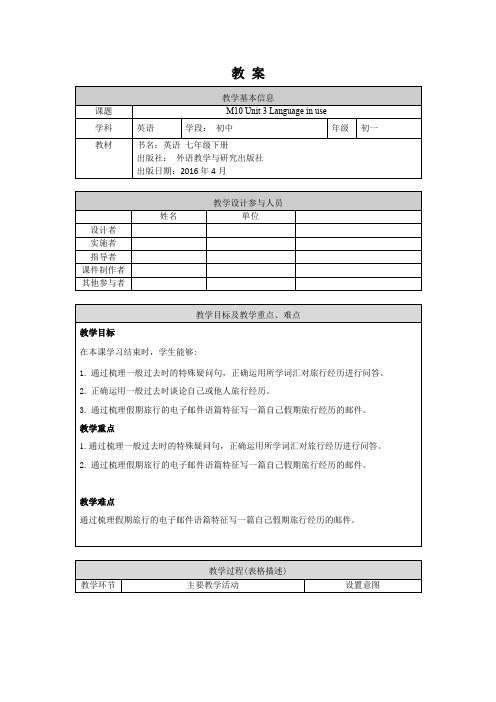
教学环节
主要教学活动
设置意图
总结语法结构和意义、电子邮件格式和特征
1.学生通过观察句子,梳理总结出一般过去时的特殊疑问句基本结构。
2.学生梳理上一单元所学关于假期旅行的电子邮件语篇特征。
引导学生能够通过观察句子,总结语法结构,理解语法意义。
引导学生回顾假期旅行的电子邮件语篇特征。
布置作业
1.复习笔记并完成任务单。
2.给Betty写一封电子邮件,介绍自己一次国内的旅行经历。
巩固课上学习内容,用所学的语言和知识做事情的能力,实现迁移创新。
运用语言知识完成真实任务
1.学生阅读Betty邮件,思考主要包括哪些方面内容,老师以一般过去时的特殊疑问句形式呈现。
2.学生思考回顾自己的假期旅行经历。
3.学生学习范文,进一步明确如何写自己的旅行经历,总结如何介绍一次旅行经历,形成结构化新知。
创设情境,促进学生用所学的语言和知识做事情的能力,实现迁移创新。
2.正确运用一般过去时谈论自己或他人旅行经历。
3.通过梳理假期旅行的电子邮件语篇特征写一篇自己假期旅行经历的邮件。
教学重点
1.通过梳理一般过去时的特殊疑问句,正确运用所学词汇对旅行经历进行问答。
2.通过梳理假期旅行的电子邮件语篇特征写一篇自己假期旅行经历的邮件。
教学难点
通过梳理假期旅行的电子邮件语篇特征写一篇自己假期旅行经历的邮件。
教 案
教学基本信息
课题
M10 Unit 3 Language in use
学科
英语
学段:初中
年级
初一
教材
书名:英语七年级下册
出版社:外语教学与研究出版社
出版日期:2016年4月
外研社版初中英语七年级下册Module 10 Unit 3 教案
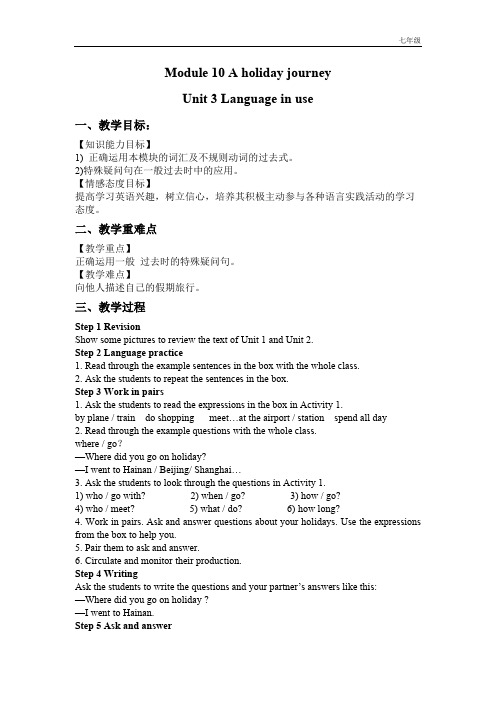
Module 10 A holiday journeyUnit 3 Language in use一、教学目标:【知识能力目标】1) 正确运用本模块的词汇及不规则动词的过去式。
2)特殊疑问句在一般过去时中的应用。
【情感态度目标】提高学习英语兴趣,树立信心,培养其积极主动参与各种语言实践活动的学习态度。
二、教学重难点【教学重点】正确运用一般过去时的特殊疑问句。
【教学难点】向他人描述自己的假期旅行。
三、教学过程Step 1 RevisionShow some pictures to review the text of Unit 1 and Unit 2.Step 2 Language practice1. Read through the example sentences in the box with the whole class.2. Ask the students to repeat the sentences in the box.Step 3 Work in pairs1. Ask the students to read the expressions in the box in Activity 1.by plane / train do shopping meet…at the airport / station spend all day2. Read through the example questions with the whole class.where / go?—Where did you go on holiday?—I went to Hainan / Beijing/ Shanghai…3. Ask the students to look through the questions in Activity 1.1) who / go with? 2) when / go? 3) how / go?4) who / meet? 5) what / do? 6) how long?4. Work in pairs. Ask and answer questions about your holidays. Use the expressions from the box to help you.5. Pair them to ask and answer.6. Circulate and monitor their production.Step 4 WritingAsk the students to write the questions and your partner’s answers like this:—Where did you go on holiday ?—I went to Hainan.Step 5 Ask and answer1. Work with a new partner.2. Ask and answer questions about your first partner like this:—Where did he / she go on holiday ?—He / She went to Hainan.Step 6 Complete the postcard1. Ask the students to read the words in the box in Activity 4.go have swim take visit write2. Ask the students to complete the postcard with the correct form of the words from the box in Activity 4.3. Check with a partner.4. Call back the answers from the whole class.5. Learn how to write a postcard.Step 7 Choose the correct answer.1. Ask the students to read through the sentences in Activity 5.1) Today is Wednesday, so yesterday / tomorrow was Tuesday.2) I was there last / next week.3) I’m going to travel around the world many years ago / in the future.4) They’re eating at a great restaurant right now / soon.5) The palace was not open in 1995 / 2103.2. Choose the correct answer.3. Ask the students to check with a partner.4. Check the answers:Step 8 Writing.Write six things you did on your last holiday.On my last holiday, I bought some presents for my friends.1___________________________________2___________________________________3 ___________________________________4 ___________________________________5 ___________________________________6 ___________________________________Step 9 Around the world: An interesting holiday1. Ask the students to look at the picture and discuss what they can see.2. Read through the information with the whole class.3. Talk something about an interesting holiday.4. Read the passage together.Step 10 Module task: Writing an email to a friend about your holiday1. Work in pairs. Ask and answer questions about your last holiday.—Where did you go ?—To…—Who did you go with ?— My family.1) How long did you stay ? 2) How did you get there ?3) Where did you stay? 4) What did you do ?2. Write your answers to the questions in Activity 7.I went to…I went with…Step 11 Grammar语法点拨——一般过去时之特殊疑问句:在一般过去时中,会出现以疑问词开头,对句中某一成分提问的句子。
新外研版七年级下册英语 Module 10 Unit 3 教案(教学设计)
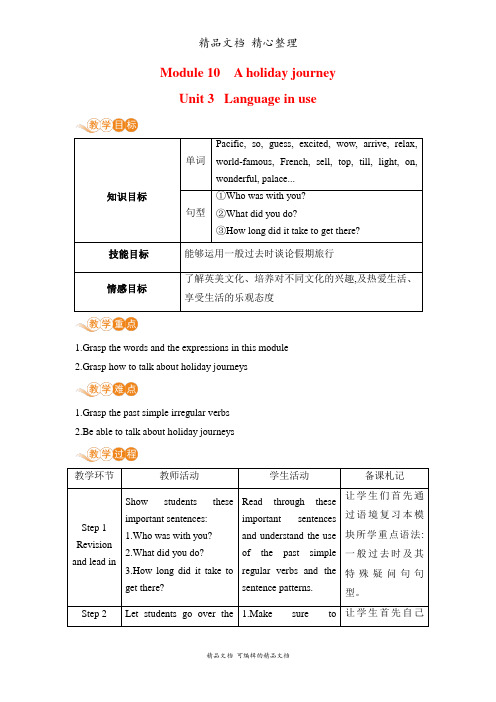
6.On my last holiday I helped Uncle Wang pick apples.
1.Write six things they did on their last holiday.
2.Work in pairs to check each other’s sentences.
3.—When did you go?
—I went there last summer.
4.—How did you get there?
—I got there by air.
5.—Who did you meet?
—I met Liu Xiang.
6.—What did you do?
—I went swimming in the sea.
4.—Who did you meet?
—I met my father’s classmate at the airport.
5.—What did you do?
—I did some shopping.
6.—How long did you stay?
—I stayed for a week.
On my last holiday I bought some presents for my friends.
_____________________________________________________
【参考答案】
1.On my last holiday I visited my grandparents in the countryside.
外研版七年级英语下册《Module 10 Unit 3 Language in use》教学设计
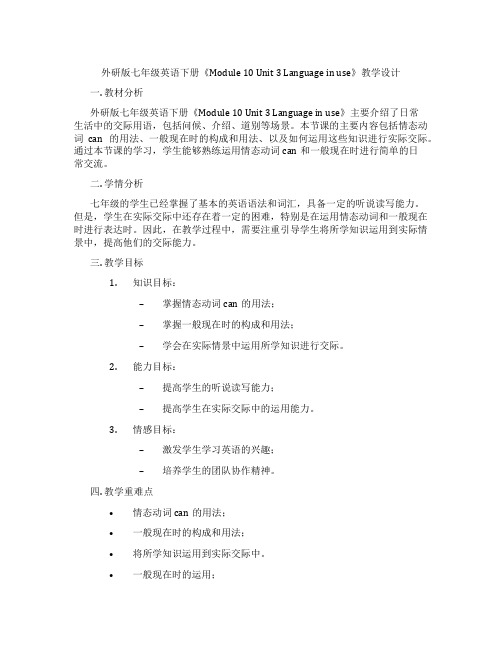
外研版七年级英语下册《Module 10 Unit 3 Language in use》教学设计一. 教材分析外研版七年级英语下册《Module 10 Unit 3 Language in use》主要介绍了日常生活中的交际用语,包括问候、介绍、道别等场景。
本节课的主要内容包括情态动词can的用法、一般现在时的构成和用法、以及如何运用这些知识进行实际交际。
通过本节课的学习,学生能够熟练运用情态动词can和一般现在时进行简单的日常交流。
二. 学情分析七年级的学生已经掌握了基本的英语语法和词汇,具备一定的听说读写能力。
但是,学生在实际交际中还存在着一定的困难,特别是在运用情态动词和一般现在时进行表达时。
因此,在教学过程中,需要注重引导学生将所学知识运用到实际情景中,提高他们的交际能力。
三. 教学目标1.知识目标:–掌握情态动词can的用法;–掌握一般现在时的构成和用法;–学会在实际情景中运用所学知识进行交际。
2.能力目标:–提高学生的听说读写能力;–提高学生在实际交际中的运用能力。
3.情感目标:–激发学生学习英语的兴趣;–培养学生的团队协作精神。
四. 教学重难点•情态动词can的用法;•一般现在时的构成和用法;•将所学知识运用到实际交际中。
•一般现在时的运用;•在实际交际中灵活运用情态动词和一般现在时。
五. 教学方法1.任务型教学法:通过设置各种实际交际任务,引导学生运用所学知识进行交流,提高他们的实际交际能力。
2.情境教学法:创设各种生活情境,让学生在真实的环境中感受和理解一般现在时和情态动词的用法。
3.互动式教学法:引导学生积极参与课堂活动,鼓励他们大胆开口说英语,提高他们的听说能力。
六. 教学准备1.教材:外研版七年级英语下册《Module 10 Unit 3 Language in use》。
2.课件:制作课件,包括图片、动画、视频等素材,以便于生动展示教学内容。
3.教学道具:准备一些日常用品,如玩具、衣物等,用于创设生活情境。
外研版七年级下册英语 Module 10 UNIT 3 Language in use导学案设计 (
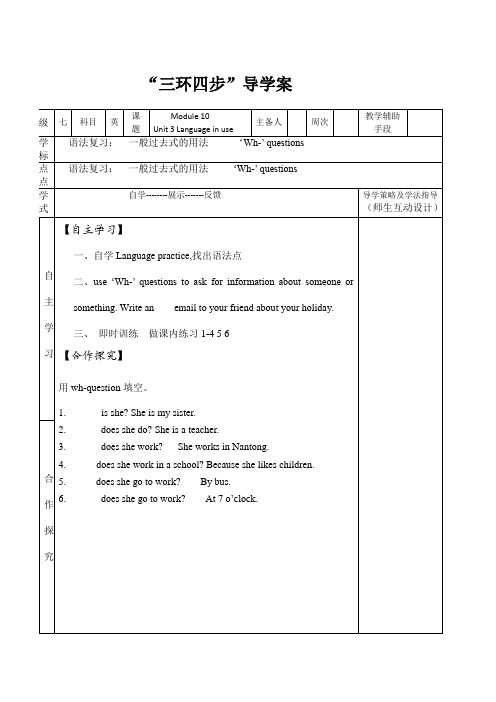
When did Betty go to Los Angeles?
【反馈检测】
A)按要求变化下面的句子,每空一词。
1. Jenny saw a film last night.(对划线部分提问)
_____ ____ Jenny ___ last night?
程
四
步
设
计
交
流
展
示
【交流展示】
一般过去时的特殊疑问句
How long did it take to get there?
Who was with you?
What did you do?
How did Betty get to Los Angeles?
Why was Betty excited at Disneyland?
2. Tony bought something in that store yesterday. (改为同义句)
Tony ___ _____ _________ in that store yesterday.
3. We visited Beijing last summer. (对划线部分提问)
____ ____ di
6. I wrote some postcards and sent some emails.(改为否定句)
I ______ ______ ______ postcards ______ ______ ______ emails.
3三、即时训练做课内练习1-4 5 6
【合作探究】
用wh-question填空。
1.______ is she? She is my sister.
Module10Unit3Languageinuse(教案)-2023春七年级下册英语(外研版)
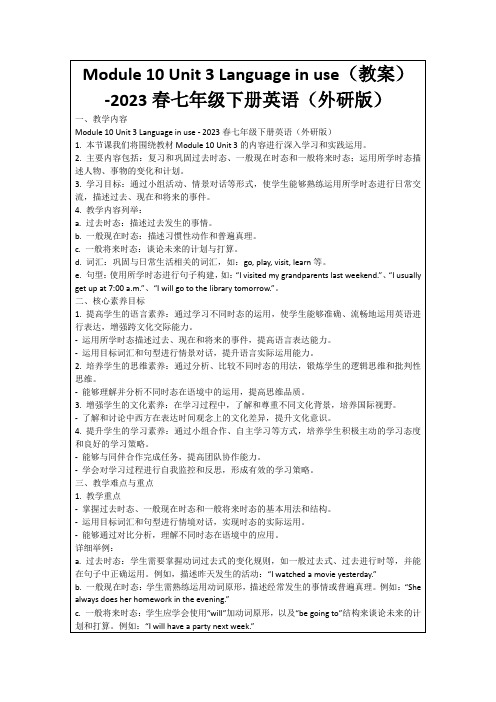
4.从学生的反馈来看,实践活动和小组讨论是他们最喜欢的环节。这让我意识到,在教学中要充分发挥学生的主体作用,让他们在实践中学习,提高他们的英语实际运用能力。
b.一般现在时态:学生需熟练运用动词原形,描述经常发生的事情或普遍真理。例如:“She always does her homework in the evening.”
c.一般将来时态:学生应学会使用“will”加动词原形,以及“be going to”结构来谈论未来的计划和打算。例如:“I will have a party next week.”
二、核心素养目标
1.提高学生的语言素养:通过学习不同时态的运用,使学生能够准确、流畅地运用英语进行表达,增强跨文化交际能力。
-运用所学时态描述过去、现在和将来的事件,提高语言表达能力。
-运用目标词汇和句型进行情景对话,提升语言实际运用能力。
2.培养学生的思维素养:通过分析、比较不同时态的用法,锻炼学生的逻辑思维和批判性思维。
(五)总结回顾(用时5分钟)
今天的学习,我们了解了过去时、一般现在时和一般将来时这三个时态的基本概念、重要性和应用。同时,我们也通过实践活动和小组讨论加深了对时态的理解。我希望大家能够掌握这些知识点,并在日常生活中灵活运用。最后,如果有任何疑问或不明白的地方,请随时向我提问。
五、教学反思
在今天的教学过程中,我发现学生们对于时态的学习表现出很大的兴趣,但也存在一些挑战。通过这个模块的学习,我深刻体会到了以下几点:
b.动词不规则变化是学生学习的难点,如“go”的过去式是“went”,“see”的过去式是“saw”。教师需通过练习和游戏等方式加强学生对这些不规则变化的记忆。
外研版英语七年级下册Module 10 Unit 3 Language in use. 课程教学设计
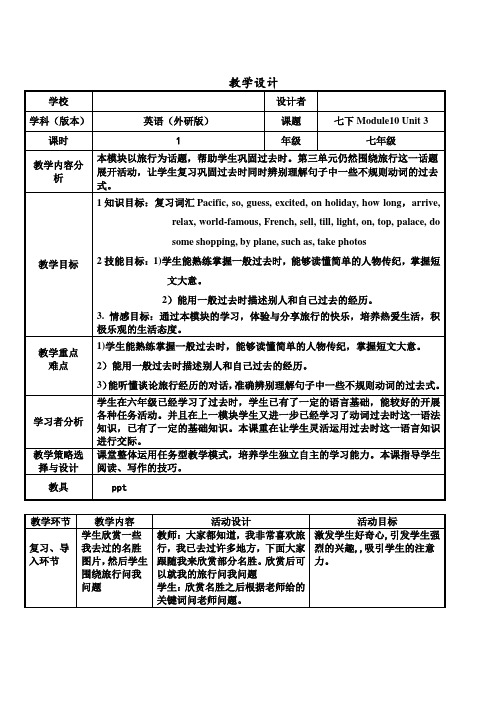
教师:我们的朋友Betty也去旅行了,在旅行中她给她的妈妈写了一封电子邮件,但在写的过程中遇到了一些问题,让我们帮帮她。
学生:完成表格,展示答案。
教师:在邮件中,Betty做了哪些事情?我们也说一说我们曾经做过的六件事情。
学生:回答老师问题,然后说说他们曾经做过的六件事情。
教师:第一轮,男生获胜,女生需要再接下来的第二轮加油了。阅读文章,回答问题。
学生:阅读文章,回答问题,展示答案。
教师:我们继续,进入第三轮:阅读文章,修改错误。
学生:阅读文章,修改错误,展示答案。
调动学生的参与热情,在练习中巩固已学知识,从而达到对已学语言的理解和运用。同时为后面的活动做一铺垫。
写作练习
3)能听懂谈论旅行经历的对话,准确辨别理解句子中一些不规则动词的过去式。
学习者分析
学生在六年级已经学习了过去时,学生已有了一定的语言基础,能较好的开展各种任务活动。并且在上一模块学生又进一步已经学习了动词过去时这一语法知识,已有了一定的基础知识。本课重在让学生灵活运用过去时这一语言知识进行交际。
教学策略选择与设计
学生:欣赏名胜之后根据老师给的关键词问老师问题。
激发学生好奇心,引发学生强烈的兴趣,,吸引学生的注意力。
巩固练习
1.两人一组操练句型
2.小组调查
3.完成表格
4.讲讲你所做过的六件事
教师:和一位学生展示对话
学生:两人一组练习对话
教师:我们都有快乐旅行,你的祖父母呢?请大家小组内调查,最后给我们做一汇报。
课堂整体运用任务型教学模式,培养学生独立自主的学习能力。本课指导学生阅读、写作的技巧。
教具
ppt
教学环节
教学内容
外研版英语七年级下册Module10Unit3《Languageinuse》word教学设计
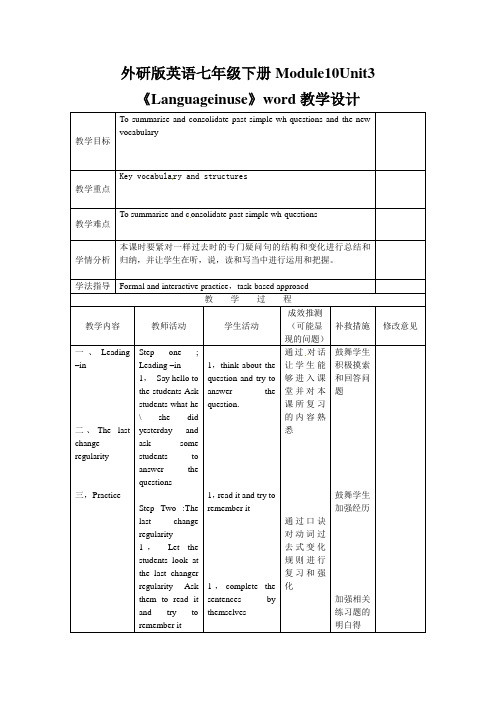
外研版英语七年级下册Module10Unit3《Languageinuse》word教学设计教学目标To summarise and consolidate past simple wh-questions and the new vocabulary教学重点Key vocabula ry and structures教学难点To summarise and c onsolidate past simple wh-questions学情分析本课时要紧对一样过去时的专门疑问句的结构和变化进行总结和归纳,并让学生在听,说,读和写当中进行运用和把握。
学法指导Formal and interactive practice,task-based approacd教学过程教学内容教师活动学生活动成效推测(可能显现的问题)补救措施修改意见一、Leading –in二、The last change regularity三,Practice Step one ;Leading –in1,Say hello tothe students Askstudents what he\ she didyesterday andask somestudents toanswer thequestionsStep Two :Thelast changeregularity1,Let thestudents look atthe last changerregularity Askthem to read itand try toremember it1,think about thequestion and try toanswer thequestion.1,read it and try toremember it1,complete thesentences bythemselves通过对话让学生能够进入课堂并对本课所复习的内容熟悉通过口诀对动词过去式变化规则进行复习和强化鼓舞学生积极摸索和回答问题鼓舞学生加强经历加强相关练习题的明白得四,Language practice五,Prac tice 六,Writing Step Thee:Practice1,Ask studentsto complete thesentences bythemselves2,Tell studentsto cheek theiranswers in pairs3,Ask somestudents tosho w theiranswers and saywhy4,Ask studentsto work in pairsand talk aboutwhat quest ionsthey could askf or eachsentencedStep Four ;Languagepractice1,Tell studentsto think aboutwhat they didtwo days ago oflast saturday2,Go throughthe sentences inthe practice boxwith students3,Ask studentsto think aboutwhat answerthey could givefor eachexample4,Tell studentsto look at thespecial structure2,cheek theiranswers with theirpartners3,show theiranswers4,talk about whatquestions theycould ask for eachsentenced1,think about whatthey did two daysago of lastSaturday2,read these ntences3,think aboutwh at answer theycould give for eachexample4,look at thespecial structure ofsentence in thesimple past andtalk about it withtheir partners5,rewrite somesentences and thencheck the answers通过练习来把握动词过去式的运用通过语言训练来归纳动词一样过去时的专门疑问句,然后在练习题中来加强和把握。
实用初中英语外研版七年级下册高效课堂资料M10U3学案
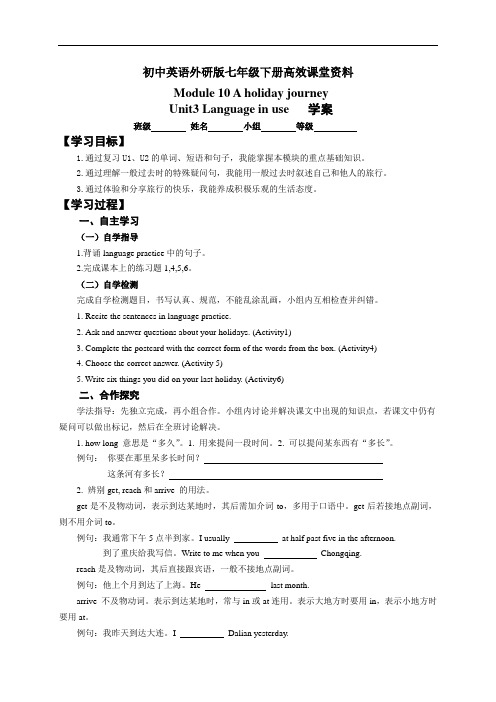
初中英语外研版七年级下册高效课堂资料Module 10 A holiday journeyUnit3 Language in use 学案班级姓名小组等级【学习目标】1.通过复习U1、U2的单词、短语和句子,我能掌握本模块的重点基础知识。
2.通过理解一般过去时的特殊疑问句,我能用一般过去时叙述自己和他人的旅行。
3.通过体验和分享旅行的快乐,我能养成积极乐观的生活态度。
【学习过程】一、自主学习(一)自学指导1.背诵language practice中的句子。
2.完成课本上的练习题1,4,5,6。
(二)自学检测完成自学检测题目,书写认真、规范,不能乱涂乱画,小组内互相检查并纠错。
1. Recite the sentences in language practice.2. Ask and answer questions about your holidays. (Activity1)3. Complete the postcard with the correct form of the words from the box. (Activity4)4. Choose the correct answer. (Activity 5)5. Write six things you did on your last holiday. (Activity6)二、合作探究学法指导:先独立完成,再小组合作。
小组内讨论并解决课文中出现的知识点,若课文中仍有疑问可以做出标记,然后在全班讨论解决。
1. how long 意思是“多久”。
1. 用来提问一段时间。
2. 可以提问某东西有“多长”。
例句:你要在那里呆多长时间?这条河有多长?2. 辨别get, reach和arrive 的用法。
get是不及物动词,表示到达某地时,其后需加介词to,多用于口语中。
get后若接地点副词,则不用介词to。
例句:我通常下午5点半到家。
外研版七年级下册Module 10 Unit 3 导学案设计(无答案)
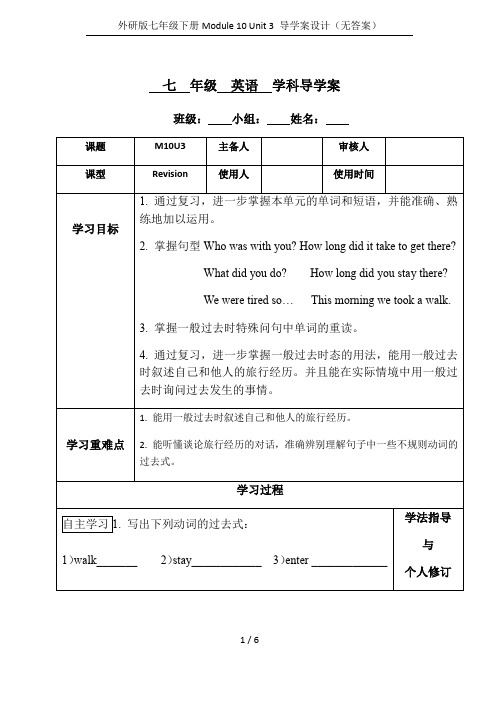
6/6
31) take___________32) eat____________ 33) run ____________
34) say ____________ 35) read ___________
2.短语
1. 去度假
2. 去那儿
3. 两年前 4. 做某事花某人多长时间 take
spend
5. 玩得开心(3 个)
外研版七年级下册 Module 10 Unit 3 导学案设计(无答案)
七 年级 英语 学科导学案
班级: 小组: 姓名:
课题
M10U3
主备人
审核人
课型
Revision
使用人
使用时间
学习目标
1. 通过复习,进一步掌握本单元的单词和短语,并能准确、熟 练地加以运用。
2. 掌握句型 Who was with you? How long did it take to get there?
1. 能用一般过去时叙述自己和他人的旅行经历。
学习重难点 2. 能听懂谈论旅行经历的对话,准确辨别理解句子中一些不规则动词的
过去式。
学习过程
自主学习 1. 写出下列动词的过去式: 1)walk_______ 2)stay____________ 3)enter _____________
学法指导 与
22) relax __________23) swim__________24) buy ____________
25) listen __________26) spend__________27) see ____________
28) go __________ 29) come __________30) meet ____________
外研版英语七年级下册Module10 Unit3参考教案
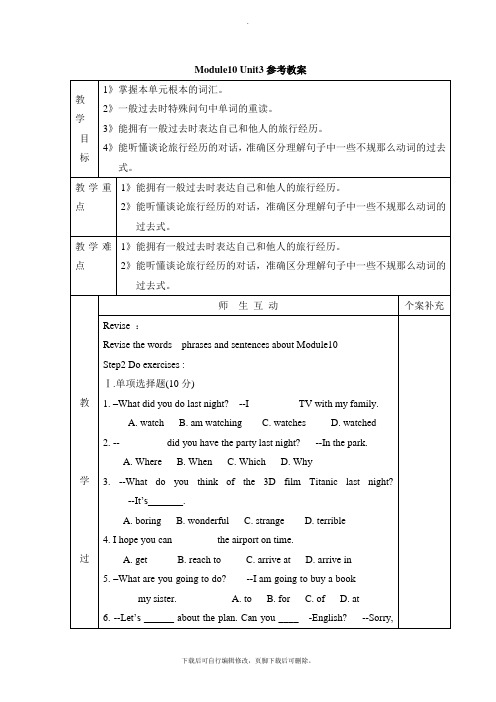
1》能拥有一般过去时表达自己和他人的旅行经历。
2》能听懂谈论旅行经历的对话,准确区分理解句子中一些不规那么动词的过去式。
教
学
过
程
师 生互动
个案补充
Revise:
Revise the words phrases and sentences about Module10
Step2 Do exercises :
根本句型及交际用语。
阿姨和Peter叔叔在机场接我们。
Aunt Joan and Uncle Peter _________ us _________ the airport.
2.我们很累,所以我们在家休息,昨天才开场我们城市之旅。
We_________ tired ______we relaxed at home and _______our tour of the city yesterday.
3.他有许多世界文明的作品,比方?梦娜.丽莎?。
It has many world-famous works of art,__________ ________ the Mona Lisa.
4.我希望你能够喜欢它!________ _______ you like it!
板书
设计
1—10 D B A C B A A D B D二,1 get to 2 did go 3 I spent on 4 for her 5 die she read三enjoyed got ate took went sent felt had四met at 2were so began3such as
A. getB. reach toC. arrive at D. in
5. –What are you going to do? --I am going to buy a book _______ my sister. A. to B. for C. of D. at
外研版英语七年级下册Module10 Unit3参考学案

Module10 Unit3参考学案一、学习目标1、掌握动词的过去时的特殊疑问句的用法。
2、熟练运用本模块所学的单词、短语和固定搭配。
3、通过体验旅行的快乐,培养乐观的生活态度。
4、能够谈论旅行。
二、预习•导学1. Review all the new words in this module and try to learn them by hear.2. Read the texts in this module .3.写出以下动词的过去式:1〕walk_______ 2〕stay____________ 3〕enter _____________ 4〕decide _________ 5〕arrive______________ 6〕live _____________ 7〕hurry_________ 8〕marry_____________ 9〕carry_____________ 10〕stop _____________ 11) step ____________12) am/is____________13) are ____________ 14) do____________15) keep ____________ 16) learn ____________ 17) leave ____________18) lend ____________ 19) lose ____________ 20) make ____________三、课堂活动1. Review the words, phrases and useful patterns in Module 10.2、Work in pair, and then do Activity 1.3.Do Activity 4-6.四、课堂检测。
I.用所给单词的适当形式填空。
1. I ___________(spend) a lot of money on books last Sunday.2. They had dinner in a (China) ___________ restaurant.3. Last night Mike ___________(send) an email to me.4. I hope you ___________ (love) the film.5. Many ________(wife) are looking forward to seeing their husbands.6. What is the ______(big) animal in the world?7. We had an _________(interest) holiday in America last year.8. Jim is good at _______(study) English.9. Hong Kong is a ________(busy) city than Tianjin.10. He _______(see) a film tomorrow with me.11. He spent an hour ___________ (finish) his work last night.12. We _______ (meet) our new teacher at the school gate yesterday morning.13. We ________ (have) a good time in Hangzhou last week.14. Jenny ________ (buy) lots of presents for her family last Christmas.15. She was _______ (tire) after she climbed the mountain.II.根据汉语提示,完成以下句子。
外研版-英语-七下-Module10 Computers 3单元 精品学案
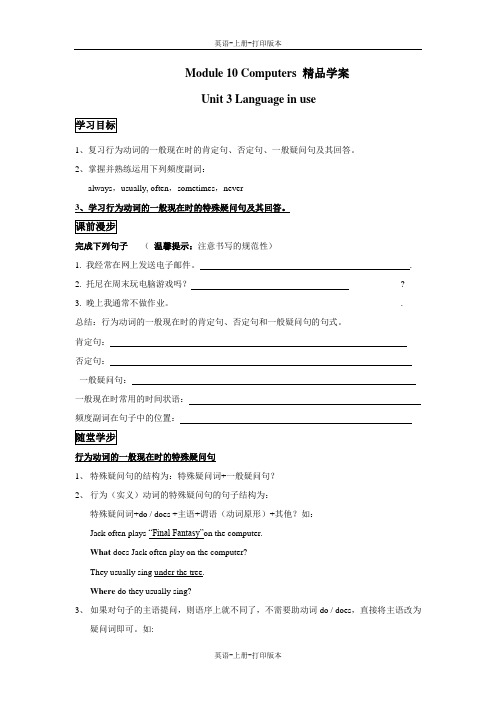
Module 10 Computers 精品学案Unit 3 Language in use1、复习行为动词的一般现在时的肯定句、否定句、一般疑问句及其回答。
2、掌握并熟练运用下列频度副词:always,usually, often,sometimes,never3、学习行为动词的一般现在时的特殊疑问句及其回答。
完成下列句子(温馨提示:注意书写的规范性)1. 我经常在网上发送电子邮件。
.2. 托尼在周末玩电脑游戏吗?____________?3. 晚上我通常不做作业。
____________________________________________________.总结:行为动词的一般现在时的肯定句、否定句和一般疑问句的句式。
肯定句:否定句:一般疑问句:一般现在时常用的时间状语:频度副词在句子中的位置:行为动词的一般现在时的特殊疑问句1、特殊疑问句的结构为:特殊疑问词+一般疑问句?2、行为(实义)动词的特殊疑问句的句子结构为:特殊疑问词+do / does +主语+谓语(动词原形)+其他?如:Jack often plays “Final Fantasy”on the computer.What does Jack often play on the computer?They usually sing under the tree.Where do they usually sing?3、如果对句子的主语提问,则语序上就不同了,不需要助动词do / does,直接将主语改为疑问词即可。
如:My mother watches TV every evening.Who watches TV every evening?一、用所给动词的正确形式完成句子:1.Sometimes Tony (have)lunch at home.2._________ your friend Lily never________ (go) online?3.My sister (not)go to school on Saturday.4.She often (stay)at home.5.Who (teach)you English in your school?二、选择:1. --- __________ do you play games? --- Never.A. WhenB. WhereC. How oftenD. How2. _________ do you usually do at the weekend?A. WhatB. WhenC. WhichD. How old3.__________ English books are there on your table?A. How muchB. How manyC. How oftenD. How4. --- __________ is that man over there? --- That’s my brother.A. WhoB. WhatC. WhereD. How5. --- What _________ your English teacher look like? --- She is quite slim.A. doB. isC. doesD. was6. --- ________ is “Lucky 52” shown on CCTV -- 2? --- Every week.A. How longB. How many timesC. How oftenD. How soon。
七年级英语下册 m10u3《Language in use》学案 外研版
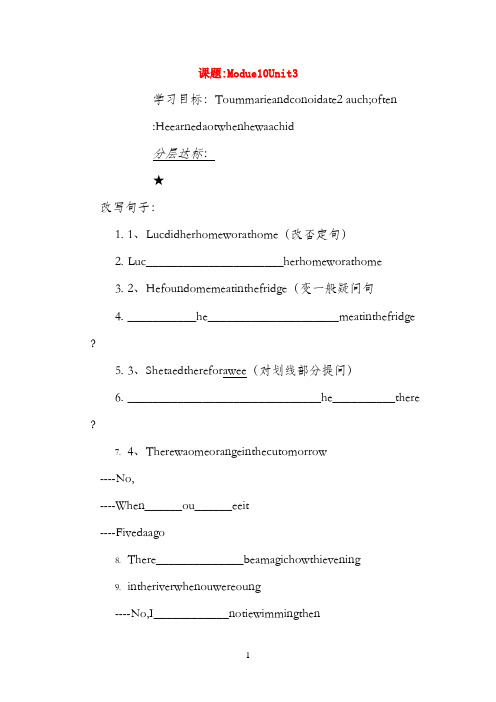
课题:Modue10Unit3学习目标:Toummarieandconoidate2 auch;often:Heearnedaotwhenhewaachid分层达标:★改写句子:1.1、Lucdidherhomeworathome(改否定句)2.Luc______________________herhomeworathome3.2、Hefoundomemeatinthefridge(变一般疑问句4.___________he_____________________meatinthefridge ?5.3、Shetaedthereforawee(对划线部分提问)6._______________________________he__________there ?7.4、Therewaomeorangeinthecutomorrow----No,----When______ou______eeit----Fivedaago8.There______________beamagichowthievening9.intheriverwhenouwereoung----No,I____________notiewimmingthen★★★完成句子:1去年夏天,我们坐火车去拜访我奶奶Latummer,we_______________________________mgrandmot her2十五岁时他就完成了他的学业Hefinihedchoo_____________________________3富人应当帮助穷人______________houdhetheoor4林涛的很多诗都是用英语写的_________________________areinEngih5“走开,我讨厌你!”她生气地说“____________,Ihateou!”Sheaidangri综合练习汉译英;1当你是个小男孩时,你骑自行车去上学吗?2他是世界上最出名的作家之一。
- 1、下载文档前请自行甄别文档内容的完整性,平台不提供额外的编辑、内容补充、找答案等附加服务。
- 2、"仅部分预览"的文档,不可在线预览部分如存在完整性等问题,可反馈申请退款(可完整预览的文档不适用该条件!)。
- 3、如文档侵犯您的权益,请联系客服反馈,我们会尽快为您处理(人工客服工作时间:9:00-18:30)。
Module 10 Life history
Unit 3 Language in use学案
2010/05/20
一、学习目标
1. 识记以下单词和词组:Cambridge, travel, snow, marry, computer games, be in colour, many channels, cell phones, satellite TV
2. 掌握下列重点句子
Did you listen to the radio? Yes, I did. / No, I didn’t.
We didn’t travel by car.
二、学习重难点
1. 动词一般过去时态的一般疑问句及其肯定、否定回答
2. 复习动词一般过去时态的否定句
三、自主学习
找出下列词组
1.听收音机_______________
2. 玩电脑游戏________________
3. 乘火车旅行_______________
4. 在学校使用电脑____________
5. 有很多频道______________
6. 彩色的______________
7. 骑自行车上学______________ 8. 使用移动电话______________
9. 去国外度假______________ 10. 卫星电视和网络______________
四、当堂练习
据意写词
1.Did you _________ ____ ________ ____ (骑自行车上学) school when you _______ a boy ?
2.Did you _________ ______________ (看电视)? No, we __________ ____ ____ _________
(听收音机).
3.Did you ________ ____________ ________ (玩电游)? No. There ________ computers
________ (那时没电脑).
4.Did you __________ ____ car (乘汽车旅行)? No, We _________ _____ _________ (乘火车
旅行).
5.Cars were (贵) so people (使用自行车) or ____________ (旅行) b y bus and train .
五、课后巩固
A.单项选择
1. is the third month of the year.
A. January
B. February
C. March
D. April
2. My penfriend was born July 5th, 1992.
A. in
B. at
C. on
D. from
3. Winter usually November January.
A. lasted from; to
B. lasts from; to
C. lasted for; to
D. lasting from; at
4. There are twelve in a year.
A. days
B. weeks
C. months
D. minutes
5. ---- was she born ? --- 199
6.
A. When; in
B. When; on
C. Where; in
D. Where; on
6. the age of thirteen, he started the piano.
A. On; play
B. At; playing
C. At; plays
D. On; playing
7. Do you enjoy books?
A. seeing
B. to see
C. reading
D. to read
8. Bill Mary in 2005.
A. marry to
B. marry
C. married to
D. married
9. He decided a great writer.
A. to be
B. being
C. have
D. to have
10. They the Great Wall yesterday and they very happy.
A. visited; are
B. visit; are
C. visit; was
D. visited; were
11. One of in China Hangzhou.
A. the most beautiful cities; is
B. the most beautiful city; are
C. the beautiful cities; is
D. most beautiful city; are
12. They use cell phones computers in the past.
A. didn’t; and
B. don’t; or
C. aren’t;.so
D. weren’t; but
B.完成句子:
1. They did some shopping yesterday .(否定句)
They shopping yesterday .
2. He returned to Beijing last week .(一般疑问句,并作否定回答)
he to Beijing last week ? , he . 3. She was at home last night .(一般疑问句)
she at home last night?
4. He did his homework at home yesterday evening. (划线提问)
he at home yesterday evening ?
5. They had lunch at school last week. (划线提问)
they lunch last week ?
6. He decided to be a teacher when he was a child . (划线提问)
he when he was a child? 7. Mr Li began to teach English when he was nineteen years old. (同义句)
Mr Li began to teach English nineteen.
8. She takes a subway to school every day . (同义句)
She every day.。
